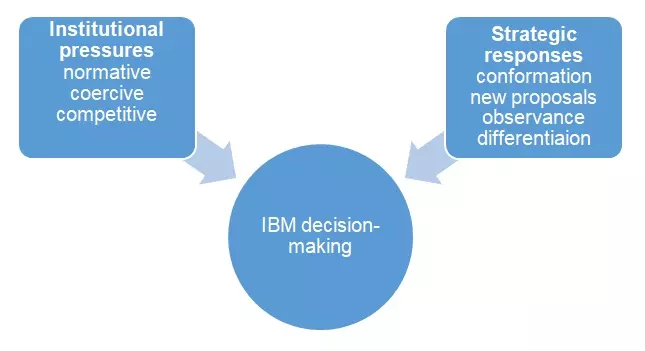International Business Machines Corporation (IBM) is an American multinational corporation that operates in 170 countries globally and significantly impacts the market of technologies. Its central office is located in Armonk, New York; however, there are many departments in other strategically important regions. The corporation manufactures, designs, and sells hardware, middleware, software and provides diverse consulting services in the area of innovation and nanotechnologies. At the moment, it is one of the leaders in this market segment with annual revenue of about $62.753 B. The company is managed by the Board of Directors who accept all critical strategic decisions and are responsible for substantial growth. At the moment, Arvind Krishna is the chair and president of IBM who correctly realizes the peculiarities of the company and contributes to its further evolution. IBM’s strategic acquisition of Red Hat company with a total value of about $34 billion is taken as the background for Continue reading
Business Analysis
Case Study: The Lego Group and Its Sacred Cows
The ability to adapt to the changing environment, customer demands, and market forces is vital to the success of a business. The mindset and practices that have propelled a company to success are not necessarily the ones that would help stay successful in the future. It is often advisable to discard the elements that drag the company down, even if they have been a part of it for half a century. These elements can be regarded as metaphorical sacred cows, which are expected to be exempt from any form of metaphorical animal cruelty. This irrational reverence can make a business go bankrupt before giving up on the familiar but obsolete practices. That exact fate almost befell LEGO, one of the most recognizable toy manufacturers in the world. Only through cutting the unnecessary ideas and changing the litigious mindset could the company save itself from the brink of ruin. Case Background Continue reading
Case Study on Green Marketing: Ecoalf’s Inspiring Business Model
In today’s world, many companies are involved in activities aimed at addressing relevant environmental issues as part of their corporate social responsibility initiatives. However, some ventures conduct their businesses while using solely green marketing as a mechanism to operate by reducing numerous negative impacts on the environment. One of the factors affecting the sustainability of fashion brands negatively is competition. Some businesses in this sector use radically distinctive development models, which allows them to keep the intermittent interest of the target market. However, without having a reputable history, this is difficult for companies to overcome the competitive barrier. As a result, high competition in such an environment affects the sustainability of brands and can often be an obstacle. The inability to withstand pressure from rivals, in turn, is directly associated with falling profits and, consequently, financial challenges. One of the trends in the fashion industry is the focus on environmental Continue reading
Case Study: History of British Petroleum and Deepwater Horizon Oil Spill
The history of British Petroleum (BP) is inextricably linked to innovative environmental projects aimed at changing the activities of the entire global industry. Back at the end of the 20th century, the corporation announced a program to transform the production of petroleum products in accordance with the principles of environmental protection. The campaign was called “More Than Oil” and implied the expansion of alternative energy production facilities, including the expansion of solar energy production. This policy cost the management team a large investment of over a hundred million dollars and, by the beginning of the 21st century, brought significant reputational benefits. British Petroleum became the most popular and respected supplier of petroleum products to various countries around the world. However, while actively expanding its oil fields, management encountered the first global problems, which served as the starting point for many environmental catastrophic events in the history of British Petroleum. In Continue reading
Case Study: Analysis of Walt Disney’s Acquisition of Lucasfilm
Walt Disney Company is one of the leading mass-media and entertainment corporations with the central office in the Walt Disney Studios in Burbank, California. At the moment, it is considered the world’s largest media conglomerate that is focused on the production of movies, cartoons, and entertaining products such as theme parks that are popular among the population globally. It is an American company headed by its president, Robert Iger who is considered a successful CEO because of a number of effective solutions contributing to the development of the company and it’s becoming a leader in the selected market segment. The company also owns other famous franchises and studios such as 21st Century Fox which contributes to the generation of the competitive advantage and significant empowerment of the corporation. Decision The decision that is discussed in terms of this case is the purchase of Lucasfilm for $4 billion by Disney. The Continue reading
Case Study of Apple Inc: How Innovation Strategy Contributes to Business Success
The Boston Consulting Group (BCG) published its ranking of the most innovative companies of 2021. The first line was taken by Apple, with Alphabet, Amazon, Microsoft, and Tesla also in the top five. The 6th position goes to Samsung; IBM Corporation takes the 7th place, and Chinese ICT giant Huawei occupies the 8th. In tenth place is Pfizer, which invented one of the vaccines for the coronavirus. Beyond that, Pfizer is one of the world’s largest drug manufacturers. Innovation is not just about making a new device; it is also about writing software code. That is done in companies that run a search engine, an operating system, or companies that make smartphones. That is why Apple has been the most technologically advanced company globally for years, and others like it are growing in that ranking year after year. In addition, Fast Company magazine ranked the innovative companies of the world Continue reading





